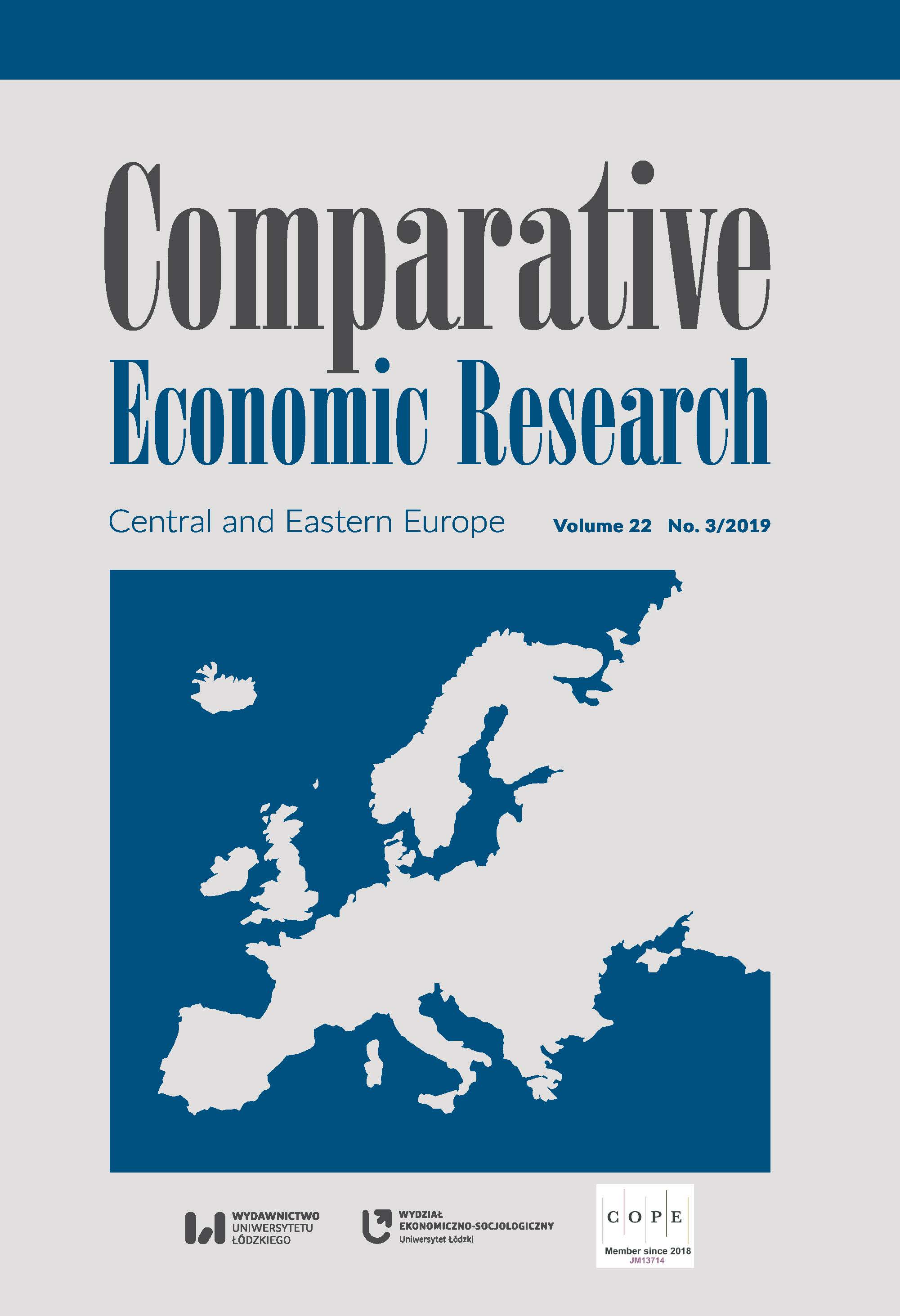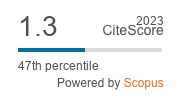The Adaptive Market Hypothesis and the Day‑of‑the‑Week Effect in African Stock Markets: the Markov Switching Model
DOI:
https://doi.org/10.2478/cer-2019-0028Keywords:
calendar effect, AMH, African stock markets, Markov Switching ModelAbstract
In line with the Adaptive Market Hypothesis (AMH), the objective of this study is to investigate how the day‑of‑the‑week (DOW) effect behaves under different bull and bear market conditions in African stock markets, and to examine the likelihood of being in a bull or bear regime for each market. A Markov Switching Model (MSM) was employed as the analytical technique. The results show that the DOW effect appears in one regime and disappears in another, in all markets, as rooted in the AMH. Lastly, all markets, except the Johannesburg Stock Exchange have a higher tendency to be in a bearish state than a bullish one. Our findings show that active investment management may yield profits for investors investing in most African markets during bearish conditions.
Downloads
References
AfricaTLF.com, (2016), Africa Equity Market Capitalisation, available at http://www.acm‑consult.com/ (accessed: 12.10.2017).
Google Scholar
Alagidede, P. (2009), Return Predictability in Africa’s Emerging Equity Markets, “International Review of Financial Analysis”, Vol. 18, No. 1, pp. 1–11.
Google Scholar
Alagidede, P. (2013), Month of the Year and Pre‑Holiday Effects in African Stock Markets, “Sajems”, Vol. 16, No. 1, pp. 64–74.
Google Scholar
Alagidede, P., Panagiotidis, T. (2006), Calendar Anomalies in an Emerging African Market: Evidence From The Ghana Stock Exchange, available at: http://ideas.repec.org/p/lbo/lbowps/2006_13.html (accessed: 5.10.2017).
Google Scholar
Atsin, J.A.L., Ocran, M.K. (2015), Calendar effects and market anomalies on the Johannesburg Stock Exchange, https://mpra.ub.uni‑muenchen.de/87448/ (accessed: 2.11.2018).
Google Scholar
Bhana, N. (1985), The Monday effect on the Johannesburg Stock Exchange, “South African Journal of Business Management”, Vol. 16, No. 1, pp. 7–11.
Google Scholar
Brishan, R. (2012), Calendar Effects on the Nine Economic Sectors of the Johannesburg Stock Exchange (A Master thesis), School of Economic and Business Sciences, University of the Witwatersrand, Johannesburg.
Google Scholar
Brockman, P., Michayluk, D. (1998), The Persistent Holiday Effect: Additional Evidence, “Applied Economic Letters”, Vol. 5, pp. 205–209.
Google Scholar
Brooks, C. (2014), Introductory Econometrics for Finance (2nd Ed.), New York: Cambridge University Press.
Google Scholar
Bundoo, S.K. (2011), An Analysis of Stock Market Anomalies and Momentum Strategies on the Stock Exchange of Mauritius, “AERC Research Paper”, Vol. 227, No. 1, pp. 1–48.
Google Scholar
Chukwuogor, C. (2007), An econometric analysis of African Stock Market: annual returns analysis, day‑of‑the‑week effect and volatility of returns, “African Journal of Accounting, Economics, Finance and Banking Research”, Vol. 1, No. 1, p. 26.
Google Scholar
Diebold, F.X., Lee, J., Gretchen, C.W. (1994), Regime Switching with Time Varying Transition Probabilities, [in:] Hargreaves, C. (ed.), Nonstationary Time Series Analysis and Cointegration, Oxford: Oxford University Press, pp. 283–302.
Google Scholar
Dragan, T., Martin, M., Igor, S. (2012), The Day of the Week Effect in South Eastern Europe Stock Markets, “Annals of the „Constantin Brancuşi” University of Targu Jiu, Economy Series”, Vol. 3, pp. 20–24.
Google Scholar
Fama, E.F. (1965), The Behaviour of Stock Prices, “Journal of Business”, Vol. 37, No. 1, pp. 34–105.
Google Scholar
Fama, E.F. (1970), Efficient Capital Markets: A Review of Theory and Empirical Work, “Journal of Finance”, Vol. 25, No. 2, pp. 383–417.
Google Scholar
Filardo, A.J. (1994), Business‑Cycle Phases and Their Transitional Dynamics, ”Journal of Business & Economic Statistics,” 12, pp. 299–308.
Google Scholar
French, K. (1980), Stock Returns and the Weekend Effect, “Journal of Financial Economics”, Vol. 8, pp. 55–69.
Google Scholar
Gibbons, M., Hess, P. (1981), Day of the week effects and asset returns, “The Journal of Business”, pp. 579–96.
Google Scholar
Goedhart, M., Koller, T., Wessels, D. (2005), Do fundamentals–or emotions–drive the stock market?, available at http://www.mckinsey.com/ (accessed: 12.10.2017).
Google Scholar
Hakan, B., Halil, KI. (2001), The Day of the Week Effect on Stock Market Volatility, “Journal of Economics and Finance”, Vol. 25, No. 2, pp. 181–193.
Google Scholar
Hamilton, J.D. (1989), A New Approach to the Economic Analysis of Nonstationary Time Series and the Business Cycle, ”Econometrica”, Vol. 57, pp. 357–384.
Google Scholar
Hansen, P.R., Lunde, A. (2003), Testing the Significance of Calendar Effects, “Working Paper”, Vol. 3, No. 3, pp. 1–39.
Google Scholar
Hassan, R., Syed, A.S., Asad Saleem, M. (2015), Day of the Week Anomaly and Market Efficiency: Evidence from KSE‑Pakistan, “International Journal of Business and Social Science”, Vol. 6, No. 9, pp. 69–75.
Google Scholar
Helena, N. (2009), A Multifactor Approach in Understanding Asset Pricing Anomalies: An empirical study of the factor model in the Budapest Stock Market (Unpublished).
Google Scholar
Julio, C.A.C., Beatriz, E.G.C. (2013), The Day‑of‑the‑Week Effect: The CIVETS Stock Markets Case, “Journal of Applied Business and Economics”, Vol. 15, No. 3, pp. 102–116.
Google Scholar
Lakanishok, J., Levi, R. (1982), Weekend Effects in Stock Returns: A Note, “Journal of Finance”, Vol. 37, pp. 883–89.
Google Scholar
Lakonishok, J., Smidt, S. (1988), Are Seasonal Anomalies Real? A Ninety‑year Perspective, “Review of Financial Studies”, Vol. 1, No. 4, pp. 403–425.
Google Scholar
Lei, G., Gerhard, K. (2005), Calendar Effects in Chinese Stock Market, “Annals of Economics and Finance”, Vol. 6, No. 5, pp. 75–88.
Google Scholar
Lim, S.Y., Ho, C.M., Dollery, B. (2007), Stock Market Calendar Anomalies: The case of Malaysia, available at: .https://www.une.edu.au/__data/assets/pdf_file/0008/67994/econ–2007–5.pdf (accessed: 15.10.2017).
Google Scholar
Lo, A.W. (2004), The adaptive markets hypothesis: market efficiency from an evolutionary perspective, available at SSRN: https://ssrn.com/abstract=602222 (accessed: 31.08.2017).
Google Scholar
Lo, A.W. (2005), Reconciling efficient markets with behavioral finance: the adaptive markets hypothesis, “Journal of Investment Consulting”, Vol. 7, No. 2, pp. 21–44.
Google Scholar
Lo, A.W. (2012), Adaptive Markets and the New World Order, “Financial Analysts Journal”, Vol. 68, No. 2, pp. 18–29.
Google Scholar
Lo, A.W., Blume, L., Durlauf, S. (2007), The New Palgrave: A Dictionary of Economics (Second Edition), New York, Palgrave McMillan.
Google Scholar
Lukas, M. (2009), Stock Market Seasonality: Day of The Week Effect and January Effect. (Thesis).
Google Scholar
Lukas, J. (2012), Analysis of stock market anomalies: US cross‑sectoral comparison (Bachelor thesis), Charles University in Prague, Faculty of social sciences, Institute of economic studies.
Google Scholar
Magnus, K. (2008), Seasonal Anomalies in the Swedish Stock Market from an Industry Perspective. Department of Economics, Lund University, Sweden.
Google Scholar
Merrett, G.J., Worthington, A.C. (2006), An empirical note on the holiday effect in the Australian stock market, 1996–2006, School of Accounting and Finance, University of Wollongong, Wollongong 7 (11), pp. 1–10.
Google Scholar
Martin, S. (2011), Characterization of Financial Time Series, “Research Note”, Vol. 11, No. 1, pp. 1–35.
Google Scholar
Osazevbaru, H.O., Oboreh, J. (2014), The “Monday Effect” in Nigerian Stock Market: Evidence and Implication, “Journal of Social Sciences and Public Policy”, Vol. 6, No. 1, pp. 1–8.
Google Scholar
Pandey, F., Samanta, A. (2016), An Empirical Analysis of January Effect–Evidence from Indian Market, “International Journal of Innovative Research and Development”, Vol. 5, No. 7, pp. 187–197.
Google Scholar
Rich, S. (2018), Calendar Effects on the Johannesburg Stock Exchange: A Markov Switching Approach (M.Sc. Thesis), Gordon Institute of Business Science, University of Pretoria.
Google Scholar
Rossi, M. (2007), Calendar anomalies in stock returns: Evidence from South America. (Bachelors’ thesis), Lappeenranta University of Technology Department of Business Administration Section of Finance.
Google Scholar
Rystrom, D.S., Benson, E.D. (1989), Investor Psychology and the Day‑of‑the‑week Effect, “Financial Analysts Journal”, Vol. 45, No. 5, pp. 75–78.
Google Scholar
Shakeel, K., Douglas, M., Chimwemwe, C. (2013), Changing Patterns in The Day‑Of‑The‑Week Effects in African Stock Markets, “International Business & Economics Research Journal”, Vol. 12, No. 10, pp. 1157–1174.
Google Scholar
Shiok, Y.L., Chong, M.H., Brian, D. (2007), Stock Market Calendar Anomalies: The Case of Malaysia, http://www.une.edu.au/economics/publications/ecowps.php (accessed: 6.10.2017).
Google Scholar
Thaler, R.H. (1999), The End of Behavioural Finance, “Financial Analyst Journal”, Vol. 55, No. 6, pp. 12–17.
Google Scholar
Toit, E. Du, Hall, J.H., Pradhan, R.P. (2018). The day‑of‑the‑week effect: South African stock market indices, “African Journal of Economic and Management Studies”, Vol. 9, No. 2, pp. 197–212.
Google Scholar
Umar, B.N. (2013), The Day of the Week effect on stock market returns and volatility: Evidence from Nigeria and South Africa, Munich Personal RePEc Archive. Online at http://mpra.ub.uni‑muenchen.de/48076/ (accessed: 8.02.2018).
Google Scholar
Urquhart, A., McGroarty, F. (2014), Calendar effects, market conditions and the Adaptive Market Hypothesis: Evidence from long‑run U.S. data, “International Review of Financial Analysis”, Vol. 35, pp. 154–166.
Google Scholar
Vergin, R.C., Mcginnis, J. (1999), Revisiting the holiday effect: Is it on holiday?, “Applied Financial Economics”, Vol. 9, No. 5, pp. 477–482.
Google Scholar
Wing‑Keung, W., Aman A., Nee‑Tat, W. (2006), The Disappearing Calendar Anomalies in the Singapore Stock Market, “Lahore Journal of Economics, Department of Economics”, The Lahore School of Economics, Vol. 11, No. 2, pp. 123–139.
Google Scholar
Downloads
Published
How to Cite
Issue
Section
License

This work is licensed under a Creative Commons Attribution-NonCommercial-NoDerivatives 4.0 International License.











